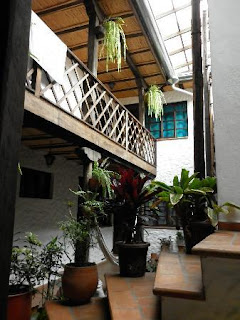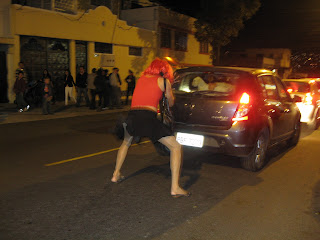In January of 2011, I met with a woman who was pursuing her Master's degree at Indiana State University. At the time, I was in the last semester of of my Master's program. I had, of course, seen Stephanie Reinert before, had ran into her in the copy room and waved in passing in the department hallway, but we had never talked and had really never formally met. One day Stephanie asked if I would be interested in meeting with her to talk about a place in the middle of the Ecuadorian Amazon known as Yachana. That name, Yachana, means a lot more to me now, but I do remember being intrigued simply by the name. I would later come to learn that "yachana" is a word from the indigenous language Quichua and it can be translated to English as, "a place for learning." Regardless of anything that has happened in the last eight months, one thing that is completely undeniable is that Yachana most certainly has been, for me and many others, a place for learning.
If you have been following my journey, then you already know what my decision was in the end. When Stephanie met with me I was frantically trying to figure out how to find a job in and move back to Buenos Aires, Argentina. Interestingly enough, Stephanie's stories and a few conversations with the founder of Yachana were all it took for me to sign on. I think, at the time, I was easily convinced due to my romanticized predisposition to want help out and work alongside people who are doing positive things in the world. I don't use the phraseology, "work make a difference in the world," because the thought of that just sort of bothers me (I'll explain later). After hearing about Yachana, I did think it would be a great place to do something productive and important. So, did we do productive and important things? I think the answer to that might surprise you.
When I see or hear phrases like "make a difference," "provoke a positive change," or, "work towards a better/brighter future," I not only feel a strong repulsion for how generic and overused such phrases are, I also think that using such ideologies is pretty damn pretentious. Aside from all of that, it takes a pretty self-confident or delusional individual to think that they alone can "change the world." So, you will never catch me saying that what I have done at Yachana is going to somehow change the world. After becoming so close with the other volunteers, I can safely say that they would never say that either. The truth is, any halfway intelligent, not full of him or herself, volunteer doesn't expect to change the world. A decent volunteer is simply socially conscientious and wants to use their talents to help out in whatever way they might be useful.
In Berlin there is a 1.3 km section of the Berlin Wall, which has been conserved as a public display of art known as the "East Side Gallery." On one particular part of the wall, there exists a very interesting and profound inscription, it says, "Many small people, who in many small places, do many small things, can alter the face of the world." Now, I don't know about the whole "alter the face of the world" part, but I would like to think that, in the time we spent at Yachana, we were able to do some small things in a small place that I hope will be useful for the kids that we taught. I'm willing to accept that not everyone one of the students will now have a better life after this year (in fact many of them won't), but I do think that what we have done has improved their chances. Regardless of anything else, I can safely say that all of the students at Yachana High School improved their English abilities, increased their Math skills, learned about different literature they were previously unaware of (some even became big readers), and picked up on a lot of practical and useful knowledge from their internships. None of this is guaranteed to help them in the future, but I'm guessing that it certainly won't hurt.
Certainly the kids got something out of all the work that we have done, but what about me? Early, when I was talking about what makes a good volunteer, I hope I didn't make it sound like volunteers are completely selfless. The fact is that being a volunteer does have a lot of self serving functions as well. If people did everything without thinking about themselves, the Peace Core wouldn't exist. It's funny because not all volunteers are the same, some are much much more self-serving than others. There are volunteers with a savior complex, volunteers with a messiah complex (also known as missionaries), superman volunteers (who think they can "fix" the world), gringo "spread the American way volunteers," environmental "save the planet" volunteers, and the list goes on. What kind of volunteer am I? The truth is I never really thought about it, and that's where Dylan come in. When I made the decision to come down and work with Yachana, I didn't think too much about it. Like I said, it didn't take much to convince me. Don't think twice, it's alright!
I couldn't be happier that I didn't think twice when it came to making the decision to go out into the middle of the jungle. Would I do it all over again? Of course I would. When I said Yachana has been a place for learning, I meant it. I believe, and I'm sure you'll agree if you have been following my blogs, that I have learned just as much, if not more, than my students.
What now? Well, for one thing, I have been spending the past couple of weeks in Quito just to get acclimated to living in civilization again. Once you've been trained to be in constant jungle mode, debriefing takes a bit of time. I have to remind myself that there is really no longer any need to shake out shoes or clothes before putting them on, hot showers feel pretty damn good, I like not sweating 24 hours of the day, I'm still getting used to the feeling of dryness and I don't have to check furniture, walls or beds for Bullet Ants before leaning, sitting or sleeping on them. Yes, being in Quito requires a whole different set of survival skills. Instead of worrying about being attacked by an animal, you worry about getting mugged, instead of sweating to death, you have to put on five blankets to go to bed at night, and instead of walking a mile to the lodge, I walk up hill to a bus stop and am out of breath by the time I get there (altitude). Canoes have been replaced with motion sickness provoking buses, pure air has been replaced with smog, and the croak of frogs and the sounds of millions of insects and animals at night has been replaced with police sirens and muffler backfires. Yes, it's a strange transition and I'm sure it will get stranger when I get back to the states. It's not all bad though, I appreciate the fact that I have 24hr, reliable and fast access to the net, a hot cup of coffee every morning, constant electricity, lights at night, and ice cream!
My plans have changed a bit, a lot bit. You may not have been expecting this blog this early on, after all the school year was supposed to be for ten months. Due to some unfortunate happenings that I won't bore you with, the year ended two months earlier than planned. It was a bit surreal, bittersweet and sad, but we were informed of a situation and had to say goodbye to all of the students in a matter of less than 24 hours. It was interesting saying goodbye to all of those kids, they had become my family over the eight months that we spent together. The interesting thing is that most of them were very matter of fact about their goodbyes. You can definitely tell that they are used to people coming and going in their school lives. The good thing is that they always have each other and I know they will be alright. I'm sure I'm going to miss them more than they'll miss me.
Two days ago I had to say goodbye to Amanda (the first Yachana volunteer that I met, we were on the same flight into Ecuador and we traveled to Baños together), she´s back in Pennsylvania, Ryan (the other Indiana guy, from Crawfordsville, who I am exactly the opposite of, but became very good friends with) and Stephanie will be heading down to Vilcabamba shortly to live there for a month. Just like that, our little family of volunteers was broken up. It's been too long since I've cried and the moments in which we said goodbye were tough, but I still didn't cry. Along with the kids, I've been missing these guys a whole lot in the past few days and maybe I should just bring on the tears :-)
It's really tough to go back to your home country after you've been in another for an extended period of time. It was insanely difficult when I went back to Indiana after studying in Buenos Aires. The good thing is that I know that it's going to be hard and I'm going to just have to start preparing myself for that. I think I'll write short blogs about the re-entry process, it's really very interesting. Maybe writing about what's going on will help me mentally deal with it, I think you will be surprised about some of the things that happen to you. It's called reverse cultural shock, and I'm thrilled that I'll be going through it yet again, let me tell you.
As I finish up here, the lighting is showing me yet another thing that will be different when I get back in the states. What do I mean by lighting? Well, it's 6:30 pm and there is no light, that's what I mean. Twelve hours of day, twelve hours of night, not in Indiana. Let me put that on my list, get used to crazy Indiana time again. Back to the U.S., it won't be long, on the 10th of May, as a matter of fact. See you soon, save a three-eyed fish for me!





























